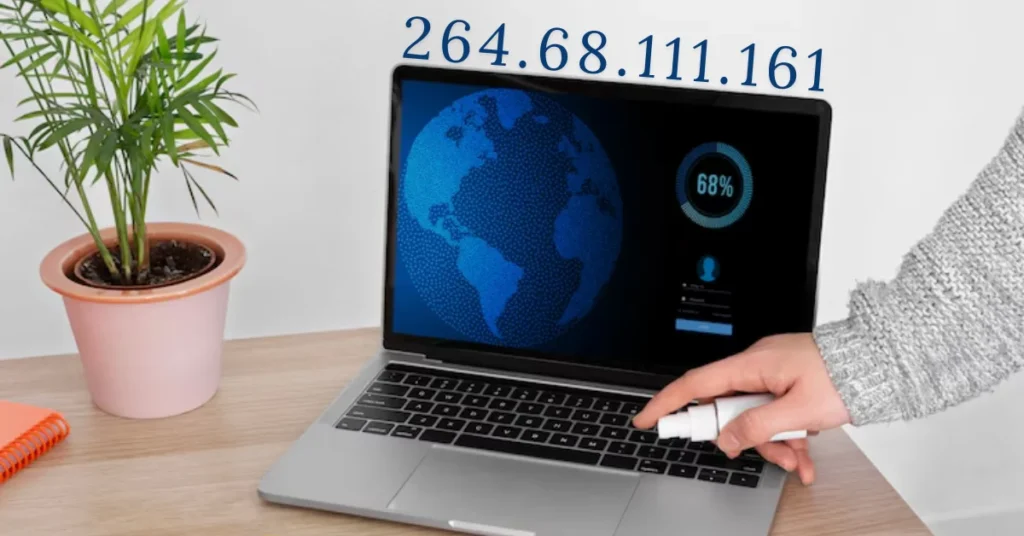Introduction to IP Addresses
What is an IP Address?
An IP address is like your home’s digital address. It tells the internet where to send data, whether that’s a web page, a video, or a social media message. Without 264.68.111.161 IP addresses, the entire internet would fall apart—literally.
Why 264.68.111.161 is More Than Just Numbers
Sure, it looks random. But 264.68.111.161 isn’t just some digital gibberish. It’s your online passport. It plays a major role in how you access the internet and how the internet sees you.
The Backbone of the Internet
How IP Addresses Enable Connectivity
Think of IPs as the address on your mail. Your device sends a request (like opening YouTube), and the server responds, knowing exactly where to deliver the content—all thanks to your IP.
Static vs. Dynamic IP Explained Simply
Static IPs stay the same—great for servers and businesses. Dynamic IPs? They change each session, which is what most people have. It’s like renting a different room each time you stay at a hotel.
Digging Into 264.68.111.161
Understanding the Format
The four-part format (like 264.68.111.161) follows the IPv4 standard. Each section is a number from 0 to 255, guiding traffic across the web like digital highways.
Locational Significance of an IP
Ever noticed location-based ads? Your IP plays a role in that. IPs are often linked to geographic locations, sometimes down to your city or neighborhood.
Can IPs Reveal Your Identity?
Not directly—but they give clues. Combine an IP with browser info, device data, and login habits, and companies (or bad actors) can form a pretty clear picture of you.
IPv4 vs. IPv6
Key Differences
IPv4 is older and more common—like 264.68.111.161. IPv6 is newer, built for the future, with longer addresses and more possibilities (think trillions of IPs).
Why We Still Use IPv4 like 264.68.111.161
It’s still everywhere—hardware, websites, apps. Shifting everything to IPv6 takes time and resources, so both versions coexist for now.
The Role of IP in Your Digital Footprint
Cookies, Tracking, and IP Logs
Websites log your IP alongside cookies. It’s how your preferences get remembered (or stalked). Combine these, and companies can track you across the web.
Targeted Ads and Location-Based Results
Ever searched for a flight and then saw ads everywhere? That’s your IP and cookies teaming up to push products your way.
How IP Affects Your Online Experience
Streaming and Content Access
Your IP can limit your Netflix catalog based on region. Want to watch a UK show from the US? Your IP decides if that’s allowed.
Gaming and Latency Issues
Lag in online games? Your IP’s route to game servers could be the culprit. Some ISPs even throttle connections based on your IP.
E-commerce and Pricing Differences
Airline tickets more expensive today? Sites may adjust prices based on your location—guessed from your IP.
Security Implications
Cyber Threats Through IP Exposure
Hackers can scan your IP for open ports—just like checking unlocked doors. Exposed IPs can lead to DDoS attacks, spying, or even full-on takeovers.
Common IP Vulnerabilities
- Unsecured routers
- Public networks
- Outdated firewalls
- Static IPs without protection
Troubleshooting IP Issues
IP Conflicts and Fixes
Got two devices fighting over one IP? That’s an IP conflict. Restart your router or assign static IPs manually to solve it.
Network Glitches and Dynamic IP Resets
Losing connection often? Your dynamic IP might be resetting awkwardly. Try power-cycling your modem or contacting your ISP.
How to Protect 264.68.111.161 (Your IP)
Use of VPNs and Proxy Servers
VPNs are like cloaks—your real IP stays hidden while a new one takes its place. Great for privacy, accessing geo-blocked content, and staying safe on public Wi-Fi.
Router Settings and Firewalls
Change your default passwords, update firmware, and enable firewalls. These simple steps harden your IP against intruders.
Avoiding Public Network Pitfalls
Public Wi-Fi is like an open party—anyone can listen in. Always use a VPN or avoid entering sensitive info while connected.
Advanced IP Tools and Techniques
IP Lookup Services
Curious about your IP? Tools like WhatIsMyIP or IP Location Tracker can tell you where your IP is registered, which ISP owns it, and more.
Geolocation Mapping
Businesses use your IP to find your location and personalize your experience. But beware—this info can also be used by cybercriminals.
Legal and Ethical Considerations
Is IP Tracking Legal?
Yes—mostly. Advertisers, sites, and even law enforcement use IP data. But there’s a fine line between useful and invasive.
The Ethics of Data Collection
Should your online actions be tracked because of your IP? That’s still a hot debate. Transparency and consent are key here.
Using IP for Business
Geo-Targeting for Marketing
Want to serve ads to only people in Texas? Use IP targeting. It’s one of the most efficient marketing tools around.
Access Control and Cybersecurity
Restrict access to systems based on whitelisted IPs. It’s a great way to keep intruders out while letting your team in.
Future of IP Technology
Moving Toward IPv6
With devices multiplying like crazy, we need more IPs. IPv6 isn’t just the future—it’s the solution to IP exhaustion.
AI and Smart IP Assignments
AI may soon decide your IP based on usage patterns, risk levels, and more. That’s smarter connectivity on the horizon.
Common Myths About IP Addresses
“IP Means You’re Hacked”
Not quite. Seeing unknown IPs on your activity list isn’t always dangerous. Could just be your phone syncing from Starbucks.
“You Can Hide Completely Online”
Even with a VPN, nothing’s 100% invisible. But you can get pretty close with the right tools and habits.
Final Thoughts
Understanding your IP address—like 264.68.111.161—is more important than ever. It shapes your digital identity, affects your privacy, and even influences the kind of content you see online. Whether you’re streaming your favorite shows or just browsing safely, mastering your IP is like getting a digital driver’s license: you’re finally in control of where you go and how safely you get there.
FAQs
Can someone hack me using my IP address?
Yes, but it’s rare. If your IP is exposed and your firewall is weak, it’s possible. Always use protection like VPNs and firewalls.
Is 264.68.111.161 a private or public IP?
It’s a public IP, which means it’s visible on the internet and assigned by your ISP.
How do I check my current IP address?
Go to sites like WhatIsMyIP.com, or just Google “What is my IP address?”
Should I change my IP regularly?
It depends. For added privacy, yes. Use a VPN or request a new IP from your ISP if needed.
What is the safest way to browse online?
Use a VPN, keep software updated, avoid sketchy links, and secure your Wi-Fi with a strong password.






